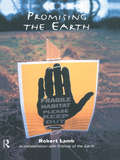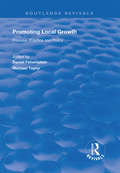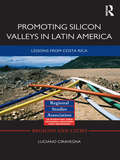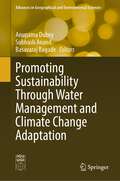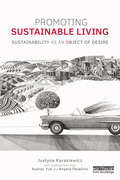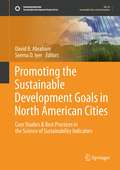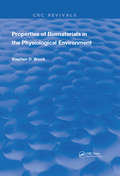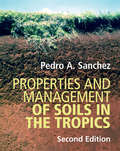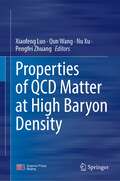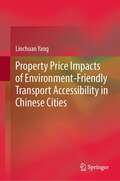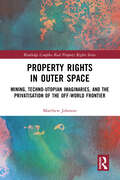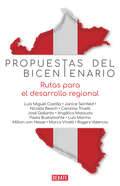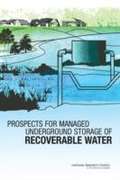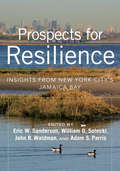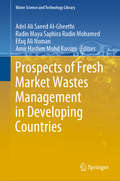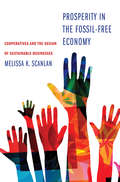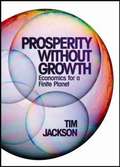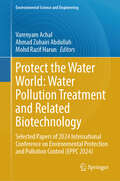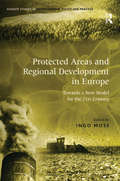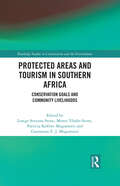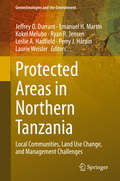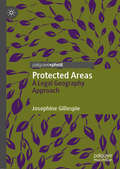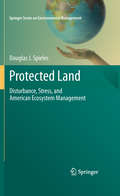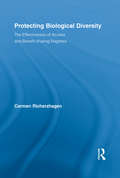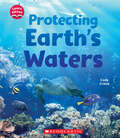- Table View
- List View
Promising the Earth
by Robert LambThis is a tale of our times. marking the 25th anniversary of Friends of the Earth, Promising the Earth locates the inside story of pioneering campaigns within a broader canvas. No single organization's record can expect to paraphrase the development of environmental consciousness and the growth of grassroots environmental movement, but experiences bear intimate witness to a story that is still unfolding.Enlivened by arresting illustrations and glimpses of colourful personalities that the issues of the day have brought to the fore, Promising the Earth takes stock of changing realities in, and attitudes to, environmental care over the past quarter-century. This eventful chronical acts as a platform from which to survey the future that lies beyond the threshold of the 21st century.
Promoting Local Growth: Process, Practice and Policy (Routledge Revivals)
by Michael Taylor Daniel FelsensteinThis title was first published in 2001. Focusing on new industries, policies and new forms of governance, the internationally renowned contributors to this volume examine the factors promoting the sub-national economic growth that is paradoxically occurring in an era of globalization.
Promoting Silicon Valleys in Latin America: Lessons from Costa Rica
by Luciano CiravegnaThe spectacular economic performance of China, East Asia and India during the last ten years has ignited some profound changes in the world economy. The share of global demand, investments, trade and production of the traditional industrialized powers, the US, Europe and Japan, has gradually yet continuously declined. This rise of China also has implications for Latin America. On the one hand, booming Chinese demand for raw materials and food has sustained the economic performance of Latin America during the last decade. On the other hand, the competitiveness of China and as a hub for advanced manufacturing is threatening Latin America’s attempt to diversify its economy from its dependence on the export of natural resource-based goods. Most Latin American countries are not however waiting passively for their economies to become ever more reliant on high prices for food, minerals and oil. Leveraging the economic and political stability that they achieved during the last decades, many countries in the region, such as Brazil, Chile, Colombia, Costa Rica and Uruguay, are attempting to capture the growing market for knowledge intensive products and services by breeding their own Silicon Valleys. This book discusses the promotion of ICT clusters in Latin America by analyzing the development of the Costa Rican cluster in particular, an often celebrated case of successful policy in the region. Costa Rica, a small country traditionally known for its coffee and wildlife, managed to build an information technology cluster within ten years, becoming the leading producer of ICT per capita in Latin America. Studying the Costa Rican case provides a solid starting point for understanding the challenges of building ICT clusters in Latin America.
Promoting Sustainability Through Water Management and Climate Change Adaptation (Advances in Geographical and Environmental Sciences)
by Subhash Anand Anupama Dubey Basavaraj BagadeThis book explores the concept and issues of sustainability and its symbiotic relationship with existing water resources, the surrounding climate and geospatial development. It covers many dimensions of sustainable water resources, climatic variability, change. It also includes case studies on the basis of specific problems and issues, providing sustainable solutions for the future of the earth. Over the past several decades, climate change has significantly impacted a number of components of the hydrological cycle and hydrological systems, including changes in precipitation patterns and intensity; widespread melting of snow and ice; increased atmospheric water vapour; increased evaporation; and changes in soil moisture and runoff. Excess runoff eventually reaches larger bodies of water such as lakes, estuaries and the ocean, contaminating the water supply and limiting human and environmental access to water. An improved understanding of how changing anthropogenic activities could affect water resources, and climate in various parts of the world is a necessary step towards sustainability. This awareness requires analyses of challenging interactive areas within the geosphere, biosphere, hydrosphere, cryosphere and sociosphere, as resultant long-term sustainable strategies and measures are greatly needed.
Promoting Sustainable Living: Sustainability as an Object of Desire (Routledge Studies in Sustainability)
by Audrey Yue Justyna Karakiewicz Angela PaladinoCurrent images of sustainability are often designed to instil fear and force change, not because we believe in it, but because we fear the consequences of inaction. Moving away from negative portrayals of sustainability, this book identifies the factors that motivate people to aspire towards sustainable living. It introduces the notion of sustainability as an "object of desire" that will allow people not to be scared of the future but rather to dream about it and look forward to a better quality of life. Tracing the history of major changes in our society that have dramatically altered our perceptions, beliefs and attitudes about sustainability, the book analyses the role of communications in persuading people of the benefits of sustainable living. It describes our current desires and dreams and explains why we need to change. Finally, the book suggests what could be done to not only make sustainability an object of desire, but also introduce hopes and dreams for a better future into our everyday lives. This inspiring and interdisciplinary book provides innovative insights for researchers, students and professionals in a range of disciplines, in particular environment and sustainability, sustainable marketing and advertising, and psychology.
Promoting the Sustainable Development Goals in North American Cities: Case Studies & Best Practices in the Science of Sustainability Indicators (Sustainable Development Goals Series)
by David B. Abraham Seema D. IyerThis volume presents North American best practices and perspectives on developing, managing and monitoring indicators to track development progress towards the Sustainable Development Goals (SDGs) in local communities and cities. In 4 main sections, the book presents and frames the many ways in which community indicator programs are either integrating or retooling to integrate the SDGs into their existing frameworks, or how they are developing new programs to track and report progress on the SDGs. This is the first volume that focuses on SDG adoption within the context of North Americans cities and communities, and the unique issues and opportunities prevalent in these settings. The chapters are developed by experienced academics and practitioners of community planning and sustainable development, and will add broad perspective on public policy, organizational management, information management and data visualization. This volume presents a case-study approach to chapters, offering lessons that can be used by three main audiences: 1) teachers and researchers in areas of urban, regional, and environmental planning, urban development, and public policy; 2) professional planners, decision-makers, and urban managers; and 3) sustainability activists and interested groups.
Properties Of Biomaterials In The Physiological Environment (Routledge Revivals)
by Stephen D. BruckFirst Published in 1980, this book offers a full, comprehensive guide into the relationship between biomaterials, the environments in which they are designed for, and the methods in which they are applied in Medicine. Carefully compiled and filled with a vast repertoire of notes, diagrams, and references this book serves as a useful reference for Students of Medicine, and other practitioners in their respective fields.
Properties and Management of Soils in the Tropics
by Pedro A. SanchezThe long-awaited second edition of this classic textbook expands on the first edition to include advances made in the last four decades, bringing the topic completely up to date. The book addresses critical issues such as whether humanity can feed itself, and whether it can do so in environmentally sound and sustainable ways. Written from agronomic, environmental, and ecological standpoints, the textbook employs a multidisciplinary approach, including policymaking and plant genetic improvements, as well as ecosystem services, climate change, biodiversity, sustainability and resilience. New chapters in this second edition focus on organic carbon in soil, soil biology, soils in relation to livestock production and forestry, and agroforestry. The new edition will again be the go-to textbook for courses on tropical soils, and a reference textbook for soil and agricultural scientists and development professionals working in the tropics.
Properties of QCD Matter at High Baryon Density
by Xiaofeng Luo Qun Wang Nu Xu Pengfei ZhuangThis book highlights the discussions by renown researchers on questions emerged during transition from the relativistic heavy-ion collider (RHIC) to the future electron ion collider (EIC). Over the past two decades, the RHIC has provided a vast amount of data over a wide range of the center of mass energies. What are the scientific priorities, after RHIC is shut down and turned to the future EIC? What should be the future focuses of the high-energy nuclear collisions? What are thermodynamic properties of quantum chromodynamics (QCD) at large baryon density? Where is the phase boundary between quark-gluon-plasma and hadronic matter at high baryon density? How does one make connections from thermodynamics learned in high-energy nuclear collisions to astrophysical topics, to name few, the inner structure of compact stars, and perhaps more interestingly, the dynamical processes of the merging of neutron stars? While most particle physicists are interested in Dark Matter, we should focus on the issues of Visible Matter! Multiple heavy-ion accelerator complexes are under construction: NICA at JINR (4 ~ 11 GeV), FAIR at GSI (2 ~ 4.9 GeV SIS100), HIAF at IMP (2 ~ 4 GeV). In addition, the heavy-ion collision has been actively discussed at the J-PARC. The book is a collective work of top researchers from the field where some of the above-mentioned basic questions will be addressed. We believe that answering those questions will certainly advance our understanding of the phase transition in early universe as well as its evolution that leads to today's world of nature.
Property Price Impacts of Environment-Friendly Transport Accessibility in Chinese Cities
by Linchuan YangThis book seeks to shed light on the role of environment-friendly transport accessibility in determining property prices in Chinese cities. Many environment-friendly transport modes, including walking, metro, bus rapid transit (BRT), and bus are examined. Spatial econometric models, quantile regression models, and machine learning techniques are used. This book contributes to people's understanding of the relationship between environmental-friendly transport accessibility and property prices. Moreover, it is of value to policymakers, including (1) informing urban planners/designers to plan/design cities with an adequate level of environment-friendly transport accessibility; (2) offering an evidence-based approach to implementing value capture schemes for financing investments in urban infrastructure; and (3) providing the basis for mitigating the negative externality of proximity to the transit corridor, jointly constructing comprehensive hospitals and other compatible amenities, and so forth.
Property Rights in Outer Space: Mining, Techno-Utopian Imaginaries, and the Privatisation of the Off-World Frontier (Routledge Complex Real Property Rights Series)
by Matthew JohnsonThis book explores the role of private mining rights in the utopian imaginary of space colonisation. It presents a transdisciplinary account of the new and evolving legislative frameworks that have been established in anticipation of commercial exploitation of the mineral resources of the off-world frontier. Written in an engaging style, the book investigates a novel case study in the history of capitalism and 'the commons': the emergence of a nascent space mining industry, undergirded by a contentious legislative framework. In 2015, the US passed laws that would recognise the claims of US corporations to own and sell space resources. This unilateral act of pre-emptive law-making would appear to contravene the terms of the UN Outer Space Treaty (1967), which declared that the exploration and use of outer space should be ‘for the benefit of all mankind’ and ‘not subject to national appropriation’.Using this central dynamic between privately held mining rights and outer space as a 'global commons', Matthew Johnson constructs an historical sociology of space mining – from the deep historical roots of common and private property to the contemporary networks of neoliberalism that have engaged with the commercialisation of space activity. The anticipatory expansion of private property claims beyond the Earth both resonates with and problematises the ‘terrain’ of political history, such as the tensions between states and markets, public law and private power, ‘the commons’ and exclusive property. The emerging cosmopolitics of off-world private property mirrors (and is often explicitly embedded within) neoliberal geopolitics, prompting urgent questions about how we can reaffirm principles of democracy and ‘common heritage’ in the international laws of Earth and space. This book is compelling reading for anyone interested in the social study of space, law, economics, technology, politics and property rights.
Propuestas del bicentenario: Rutas para el desarrollo regional
by Videnza ConsultoresVidenza Consultores presenta su segundo tomo de Propuestas del Bicentenario con la absoluta certeza de que el desarrollo regional es el gran reto del Estado peruano Con la absoluta certeza de que el desarrollo económico en cada una de las regiones del país es el gran reto del Estado peruano, Videnza Consultores presenta el segundo tomo de Propuestas del Bicentenario. En Propuestas del Bicentenario: Rutas para el desarrollo regional, un grupo de especialistas, con amplia experiencia en la gestión pública, despliega un conjunto de estrategias y soluciones que contribuyan a generar oportunidades de crecimiento de forma más homogénea en el territorio nacional. Para ello, se identifican y analizan algunos de los principales factores transversales requeridos para promover el avance económico y la inversión pública y privada en las regiones: descentralización, conectividad física y digital, viabilidad social, desarrollo productivo del ámbito minero, agricultor y forestal, entre otros. Asimismo, se estudian casos exitosos que, en su mayoría, conviven con otras experiencias que parecen haberse detenido en el tiempo. En un contexto en el que la pandemia, la corrupción y la inestabilidad institucional han agudizado la crisis en el país, este libro ofrece alternativas viables y esperanzadoras que permiten romper las barreras de crecimiento de las regiones, con el fin de mejorar la calidad de vida de todos los peruanos.
Prospects For Managed Underground Storage Of Recoverable Water
by National Research Council of the National AcademiesThe National Academies Press (NAP)--publisher for the National Academies--publishes more than 200 books a year offering the most authoritative views, definitive information, and groundbreaking recommendations on a wide range of topics in science, engineering, and health. Our books are unique in that they are authored by the nation's leading experts in every scientific field.
Prospects for Resilience: Insights from New York City's Jamaica Bay
by William D. Solecki John R. Waldman Eric W. Sanderson Adam S. ParrisGiven the realities of climate change and sea-level rise, coastal cities around the world are struggling with questions of resilience. Resilience, at its core, is about desirable states of the urban social-ecological system and understanding how to sustain those states in an uncertain and tumultuous future. How do physical conditions, ecological processes, social objectives, human politics, and history shape the prospects for resilience? Most books set out "the answer." This book sets out a process of grappling with holistic resilience from multiple perspectives, drawing on the insights and experiences of more than fifty scholars and practitioners working together to make Jamaica Bay in New York City an example for the world.Prospects for Resilience establishes a framework for understanding resilience practice in urban watersheds. Using Jamaica Bay--the largest contiguous natural area in New York, home to millions of New Yorkers, and a hub of global air travel with John F. Kennedy International Airport--the authors demonstrate how various components of social-ecological systems interact, ranging from climatic factors to plant populations to human demographics. They also highlight essential tools for creating resilient watersheds, including monitoring and identifying system indicators; computer modeling; green infrastructure; and decision science methods. Finally, they look at the role and importance of a "boundary organization" like the new Science and Resilience Institute at Jamaica Bay in coordinating and facilitating resilience work, and consider significant research questions and prospects for the future of urban watersheds.Prospects for Resiliencesets forth an essential foundation of information and advice for researchers, urban planners, students and others who need to create more resilient cities that work with, not against, nature.
Prospects of Fresh Market Wastes Management in Developing Countries (Water Science and Technology Library #92)
by Radin Maya Saphira Radin Mohamed Adel Ali Saeed Al-Gheethi Amir Hashim Mohd Kassim Efaq Ali NomanThis book focuses on the prospects of fresh market waste management in developing countries. It characterizes fresh market wastewater and solid wastes, and highlights the human health impact of corresponding waste management practices. With regard to treatment technologies, the book discusses the anaerobic digestion of fresh solid wastes; the application of natural coagulants for wastewater treatment; the remediation of xenobiotics in wastewater using nanotechnology; and biofilter aquaponic systems for nutrient removal. All of these technologies are recent innovations, offer several concrete advantages, and can be applied in developing countries as non-central treatment systems. In addition, the book covers electricity production from fresh solid wastes using microbial fuel cells, demonstrating the potential held by recycling fresh market wastewater and solid wastes.
Prosperity in the Fossil-Free Economy: Cooperatives and the Design of Sustainable Businesses
by Melissa K ScanlanA blueprint for creating sustainable businesses, emphasizing the power and potential of cooperative models Drawing on both her extensive experience founding and directing social enterprises and her interviews with sustainability leaders, Melissa Scanlan provides a legal blueprint for creating alternate corporate business models that mitigate climate change, pay living wages, and act as responsible community members, including Certified B Corps and benefit corporations. With an emphasis on cooperatives, this book reveals the power and potential of cooperating as a unifying concept around which to design social enterprise achieving triple bottom-line results: for society, the environment, and finance.
Prosperity without Growth: Economics for a Finite Planet
by Tim JacksonIs more economic growth the solution? Will it deliver prosperity and well-being for a global population projected to reach nine billion? In this explosive book, Tim Jackson, a top sustainability adviser to the UK government, makes a compelling case against continued economic growth in developed nations. No one denies that development is essential for poorer nations. But in the advanced economies there is mounting evidence that ever-increasing consumption adds little to human happiness and may even impede it. More urgently, it is now clear that the ecosystems that sustain our economies are collapsing under the impacts of rising consumption. Unless we can radically lower the environmental impact of economic activity - and there is no evidence to suggest that we can - we will have to devise a path to prosperity that does not rely on continued growth. Economic heresy? Or an opportunity to improve the sources of well-being, creativity and lasting prosperity that lie outside the realm of the market? Tim Jackson provides a credible vision of how human society can flourish within the ecological limits of a finite planet. Fulfilling this vision is simply the most urgent task of our times. This book is a substantially revised and updated version of Jackson's controversial study for the Sustainable Development Commission, an advisory body to the UK Government. The study rapidly became the most downloaded report in the Commission's nine year history when it was launched earlier in 2009. 10% of the proceeds from the sale of this book will be donated to rainforest protection This paperback edition includes a new foreword by HRH The Prince of Wales
Protect the Water World: Selected Papers of 2024 International Conference on Environmental Protection and Pollution Control (EPPC 2024) (Environmental Science and Engineering)
by Varenyam Achal Ahmad Zuhairi Abdullah Mohd Razif HarunThis book unveils the advancements in water pollution analysis and its biological treatment technology and provides valuable research and experience for engineers and scholars. On March 22, 2024, in the United Nations World Water Development Report, the theme of this year's conference, "Water for Promoting Prosperity and Peace," aligns with Global Water Partnerships' long-standing mission and vision of integrated water resources management. Currently, around half of the world's population faces severe water scarcity for at least part of the year, and a quarter of the global population experiences "extremely high" water stress. Meanwhile, global freshwater usage is growing at a rate slightly below 1% annually. Hence, the protection of water resources and pollution control, particularly the renewal and management of freshwater resources, deserve significant attention. Emerging pollutants of concern include per- and polyfluoroalkyl substances (PFAS), pharmaceuticals, hormones, industrial chemicals, detergents, cyanotoxins, and nanomaterials. High concentrations of antimicrobial agents have been found worldwide, originating from inadequately treated household wastewater, livestock, and aquaculture. Biological treatment technology for water pollution uses microorganisms to break down pollutants into harmless or less toxic substances, becoming an important means of addressing water pollution. Its advantages lie in low cost, adaptability, and the ability to effectively treat various organic pollutants, including hydrocarbons, pharmaceuticals, and pesticides. However, the effectiveness of this technology depends on the selection of appropriate microbial strains and the optimization of treatment conditions (such as temperature, pH, and nutrients). In the aspect of water pollution analysis, accurate detection of the types and concentrations of pollutants is a prerequisite for management and remediation. Modern instruments, such as gas chromatography-mass spectrometry (GC-MS) and liquid chromatography-mass spectrometry (LC-MS), can identify and quantify trace pollutants in complex water bodies. Additionally, new-generation sensing technologies and biological detection tools, like DNA microarrays and gene sequencing technologies, enable rapid detection of specific pollutants and reveal microbial community responses to pollutants. These technologies can effectively target and treat heavy industrial and chemical pollution, thereby protecting water environmental safety. This book aims to facilitate the exchange of scientific information among scholars from leading universities, research centers, and high-tech enterprises around the world. This book is highly beneficial to scholars, engineers, and researchers in the fields of environmental engineering and water pollution.
Protected Areas and Regional Development in Europe: Towards a New Model for the 21st Century (Routledge Studies in Environmental Policy and Practice)
by Ingo MoseWhile originally created as reserves for beautiful landscapes and endangered species, protected areas in Europe were subsequently used as a means to preserve whole ecosystems, with restrictions on human activities and impacts. More recently, protected areas are also being considered as instruments for regional development, particularly in marginal regions facing severe economic and socio-cultural problems. Contrary to previous conservation-focused policies, new approaches aim to blend conservation and development functions, making protected areas real 'living landscapes' and integrating activities such as agriculture, forestry, handicrafts, tourism and education with the conservation and sustainability aspects. The past decade has seen a marked increase in these innovative and dynamic types of protected areas. However, the policies of individual European countries are very varied. This volume provides a comprehensive overview of the relationship between protected areas and regional development policies, both in theory and practice. Illustrated with a wide range of case studies from across Europe, it compares the different concepts, strategies and instruments being used. In conclusion, it suggests the most innovative and successful ways to use protected areas for regeneration and sustainable regional development.
Protected Areas and Tourism in Southern Africa: Conservation Goals and Community Livelihoods (Routledge Studies in Conservation and the Environment)
by Lesego Senyana StoneThis volume discusses the complex relationship between Protected Areas and tourism and their impact on community livelihoods in a range of countries in Southern Africa. Protected areas and tourism have an enduring and symbiotic relationship. While protected areas offer a desirable setting for tourism products, tourism provides revenue that can contribute to conservation efforts. This can bring benefits to local communities, but it can also have a negative impact, with the establishment of protected areas leading to the eviction of local communities from their original places of residence, while also preventing them from accessing the natural resources they once enjoyed. Taking a multi-disciplinary approach, this book addresses the opportunities and challenges faced by communities and other stakeholders as they endeavour to achieve their conservation goals and work towards improving community livelihoods. Case studies from Botswana, Malawi, Namibia, South Africa, Tanzania, Zambia and Zimbabwe address key issues such as human–wildlife conflicts, ecotourism, wildlife-based tourism, landscape governance, wildlife crop-raiding and trophy hunting, including the high-profile case of Cecil the lion. Chapters highlight both the achievements and positive outcomes of protected areas, but also the challenges faced and their impact on how protected areas are viewed and also conservation priorities more generally. The volume gives these issues affecting protected areas, local communities, managers and international conservation efforts centre stage in order inform policy and improve practice going forward. This book will be of great interest to students and scholars of conservation, natural resource management, tourism, sustainable development and African studies, as well as professionals and policymakers involved in conservation policy.
Protected Areas in Northern Tanzania: Local Communities, Land Use Change, and Management Challenges (Geotechnologies and the Environment #22)
by Ryan R. Jensen Jeffrey O. Durrant Emanuel H. Martin Kokel Melubo Leslie A. Hadfield Perry J. Hardin Laurie WeislerNorthern Tanzania is an important and diverse ecological and cultural region with many protected lands. This book, Protected Areas in Northern Tanzania, brings to the forefront research on significant issues and developments in conservation and management in national parks and protected lands in northern Tanzania. The book draws attention to issues at the intersection of conservation, tourism, and community livelihood, and several studies use geospatial technologies—Geographic Information Systems and remote sensing data and techniques—to study land use and land cover conversion. With contributions from professors at the Mweka College of African Wildlife Management located at the foot of Mount Kilimanjaro and other Tanzanian researchers, the book provides important perspectives of local experts and practitioners. Protected Areas in Northern Tanzania provides a significant contribution in research and technological advancement in the areas of wildlife conservation and protected land management throughout this critical region.
Protected Areas: A Legal Geography Approach
by Josephine GillespieThis book argues that legal geography provides new insights into contemporary conservation challenges. Despite unprecedented efforts, we are facing an extinction crisis, and in situ protected area programs are falling short. This book discusses the protected area phenomenon and calls for changes to current approaches, informed by legal geography –an inter-disciplinary area focused on the intertwined people–place–law dynamics that enable, or disable, effective management practices. The book examines two protected area types: World Heritage Sites, where places of ‘outstanding universal value’ are protected for all humanity, and Ramsar protected wetland sites, one of the first global environmental protection initiatives. Using case studies from the Australasian region (Australia, the Pacific and Southeast Asia), it reveals how current approaches can be improved by taking into account the people–place–law nexus embedded in legal geography research.
Protected Land
by Douglas J. SpielesThis is a book about ecosystems: the ways in which we perceive them, conceptualize them,protect them, and manipulate them. Ecosystems have been given considerable attention inrecent literature, and with good reason. Our growing comprehension of irreplaceable andimperiled ecosystem services has made it clear that we are in the midst of an ecological crisis.In response, various organizations, agencies, and individuals have dedicated themselves to thepreservation, restoration, and maintenance of ecological systems. The United States is a worldleader in this regard, building upon the legacy of giants like Thoreau, Muir, and Leopold.And yet, even as we scramble to rehabilitate and sustain ecosystems, the debate on their naturecontinues. In one corner are proponents of holism--those that see ecosystems as definableunits with recognizable and regenerative stable states.
Protecting Biological Diversity: The Effectiveness of Access and Benefit-sharing Regimes (Routledge Studies in Development and Society #24)
by Carmen RicherzhagenDuring the last ten years the enormous global loss of biodiversity has received remarkable attention. Among the numerous approaches undertaken to stop or lessen this process, access and benefit-sharing (ABS), a market-based approach, has emerged as among the most prominent. In theory, ABS turns biodiversity and genetic resources from an open access good to a private good and creates a market for genetic resources. It internalizes the resources’ positive externalities by pricing the commercial values for research and development and makes users pay for it. Users’ benefits are shared with the resource holders and set incentives for the sustainable use and the conservation of biodiversity. Carmen Richerzhagen, however, finds that in practice there are significant questions about the effectiveness of the approach in the protection of biodiversity and about the fair and equitable sharing of benefits arising from the commercialization. Utilizing the empirical findings of three case studies of biodiversity-providing countries - Costa Rica, the Philippines and Ethiopia - and one case study of a community of user countries, the European Union (EU), Richerzhagen examines the effectiveness of ABS through the realization of its own objectives.
Protecting Earth's Waters (Learn About)
by Cody CraneAn essential tool to teach kids about the importance of water!Did you know that water covers almost three-fourths of Earth’s surface? More than half the world’s creatures live in this water. And the rest cannot survive without it! That’s why it is so important to protect this vital resource, which has been threatened by pollution and other human-made dangers. Discover more about what is threatening Earth’s most precious resource, as well as what is being done to protect it, in Protecting Earth’s Waters.ABOUT THIS SERIES:Earth is known as the Blue Planet because of the abundant amount of water that covers our home. And nothing on Earth could survive without it. As we find ourselves facing a global water crisis, learning about this life-giving resource has never been more important. The books in this series are filled with colorful photos and diagrams, plus easy-to-digest text, and fascinating facts. And they offer young readers an in-depth look at what water is, how we use it, and most importantly, what we can do to protect it.
